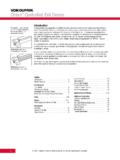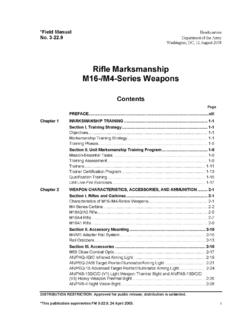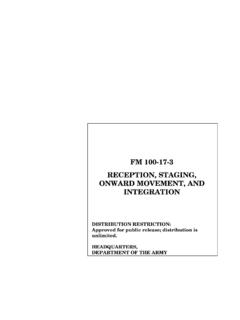Transcription of Organizational Behavior and Human Decision Processes
1 Organizational Behavior and Human Decision Processes xxx (2013) xxx xxx Contents lists available at SciVerse ScienceDirect Organizational Behavior and Human Decision Processes journal homepage: Seeing green: Mere exposure to money triggers a business Decision frame and unethical outcomes Maryam Kouchaki a, , Kristin Smith-Crowe b, Arthur P. Brief b, Carlos Sousa b,1. a Edmond J. Safra Center for Ethics, Harvard University, Cambridge, MA 02138, United States b Department of Management, David Eccles School of Business, University of Utah, Salt Lake City, UT 84112, United States a r t i c l e i n f o a b s t r a c t Article history: Can mere exposure to money corrupt? In four studies, we examined the likelihood of unethical outcomes Received 19 August 2011 when the construct of money was activated through the use of priming techniques. The results of Study 1.
2 Accepted 2 December 2012 demonstrated that individuals primed with money were more likely to demonstrate unethical intentions Available online xxxx than those in the control group. In Study 2, we showed that participants primed with money were more Accepted by Madan Pillutla likely to adopt a business Decision frame. In Studies 3 and 4, we found that money cues triggered a busi- ness Decision frame, which led to a greater likelihood of unethical intentions and Behavior . Together, the Keywords: results of these studies demonstrate that mere exposure to money can trigger unethical intentions and Ethics Immorality Behavior and that Decision frame mediates this effect. Money 2012 Elsevier Inc. All rights reserved. Business Decision frame Unethical Behavior Environmental cue Introduction morality is based in empathy and that empathy is a capacity we see in other primates, not just in Human beings, suggesting that Judas betrayed Jesus for 30 pieces of silver.
3 For Dante (14th cen- we as Human beings were hardwired very early on with this so- tury/1985) Judas' crime condemned him to the lowest level of hell. cially based capacity for emotion and morality. Indeed, Judas has been known throughout the centuries as an While social bonds may promote morality, weak social bonds archetype of immorality. The repugnance of Judas' Behavior is in may make immorality more likely. And, of course, we know that the severing of social bonds for mere money. Scholars through time despite our hardwired capacity toward morality, we fail to always and across disciplines have told and continue to tell us that moral- act morally. What is it that can weaken the hold of social relations? ity is rooted in social relations. As Rai and Fiske (2011, p. 57) put it, One compelling answer comes from Marx (1844/1964, p. 119) who moral intuitions are not based on asocial principles of right argued that money, a ubiquitous presence in modern commercial actions.
4 Rather, moral intuitions are de ned by the particular society, can corrupt Human nature itself, weakening or severing types of social relationships in which they occur.'' Similarly, Haidt our social bonds: As this perverting power, money then appears and Kesebir (2010, p. 800) explained, moral systems are interlock- as the enemy of man and social bonds that pretend to self- ing sets of values, virtues, norms, practices, identities, institutions, subsistence.'' What is arguably more fascinating is the in uence technologies, and evolved psychological mechanisms that work to- of subtle exposure to money on Behavior and decisions the in u- gether to suppress or regulate sel shness and make social life pos- ence that the mere presence of money or a symbolic representation sible.'' That is, as social animals our notion of morality involves of money may have on us without our awareness ( , Zhou, Vohs, standards of conduct within the embedded social context which & Baumeister, 2009).
5 For instance, Vohs, Mead, and Goode (2006). function to coordinate and facilitate survival (de Waal, 2006; Haidt, found that participants primed with money were more likely to 2008). Importantly, morality is not restricted to direct harm; choose an individual activity ( , four personal cooking lessons). rather, it is a broad cooperative scheme entailing restrictions on over a group activity ( , an in-home catered dinner for four). anti-social behaviors that may be considered wrong even in the ab- What we do not know, however, is what the effects of subtle expo- sence of harm (cf. Kant, 1785/1964). The roots of morality in social sure to money on morally relevant outcomes might be. Money is a relations are deep. De Waal (1996) has famously argued that ubiquitous feature of modern life and business organizations, in particular. As such, this question of whether mere exposure to Corresponding author.
6 Money might in uence individuals' morally relevant Behavior E-mail address: (M. Kouchaki). becomes especially important. That is, money may be a more 1. Author's af liation at the time of contribution; he is no longer there. 0749-5978/$ - see front matter 2012 Elsevier Inc. All rights reserved. Please cite this article in press as: Kouchaki, M., et al. Seeing green: Mere exposure to money triggers a business Decision frame and unethical outcomes. Organizational Behavior and Human Decision Processes (2013), 2 M. Kouchaki et al. / Organizational Behavior and Human Decision Processes xxx (2013) xxx xxx insidious corrupting factor than previously appreciated, going well relationships as either social or based on economic exchanges beyond the often lamented love of money'' to touch even those and labeling the latter as money-market'' relationships (Heyman not overtly motivated by greed.)
7 & Ariely, 2004). Consistently, there is a considerable body of liter- In the current paper we address this void in the literature by ature in sociology arguing that money depersonalizes relationships considering the role of exposure to the construct of money in ( , Baker & Jimerson, 1992; Coleman, 1974, 1990; Giddens, 1990;. immorality. We extend the prior work on the potential outcomes Simmel, 1907/1978; also see, for example, Marx, 1844/1964). that can result from the activation of the construct of money by Levine (1985) went so far as to state that money suppresses demonstrating that exposure to money can lead to unethical out- people's emotional or sentimental disposition'' (p. 202). comes. We further demonstrate that a business Decision frame'' So why might depersonalization of social relationships as a (Tenbrunsel & Messick, 1999) mediates this effect.
8 Theoretically, product of exposure to the construct of money matter morally? we argue that a business Decision frame entails objecti cation of Generally speaking, morality has been said to be embedded in so- social relationships (either those who stand to be directly harmed, cial relationships ( , Haidt & Kesebir, 2010; Rai & Fiske, 2011). or others more broadly construed) in a cost bene t calculus in The more tenuous the relationship, or social bond, the less morality which self-interest is pursued over others' interests ( , it entails matters. This notion is consistent with reasoning concerning circles a focus on one's gains and losses largely to the exclusion of bene ts of moral regard, whereby those outside the metaphorical circle and costs to others); as such, it weakens social bonds and thus the (those with whom our social bonds are weak) are less worthy of pull of morality.
9 Even in instances when there is not a particular our moral regard (Reed & Aquino, 2003; Singer, 1981). Likewise, social relationship at stake, such objecti cation means that one we tend to show greater moral consideration to our in-group does not think about others in general; rather, one thinks about members than we do toward members of out-groups (Reed &. self-interest in maximizing one's outcomes even if it means violat- Aquino, 2003). When individual targets are objecti ed and the so- ing the moral rules that constitute the fabric of society. cial bonds with them weakened, the psychological evidence seems In what follows we rst review the literature on money and its clear that they are treated in less moral ways ( , Gruenfeld, Inesi, link to immorality. Then, we present our argument that it is Magee, & Galinsky, 2008; Loughnan et al., 2010). through a business Decision frame that mere exposure to the con- Research also has shown that concepts that are closely associ- struct of money can lead to unethical outcomes.
10 Finally, we report ated in the mind are often activated by one another and that such the results of four studies consistent with our theorizing and dis- automatic activation affects subsequent judgment and Behavior cuss the ndings and their implications. ( , Bargh, 1990, 2006; Hebb, 1949). Primes have been shown to exert effects on perception and Behavior by increasing the accessi- bility of relevant and applicable cognitive constructs (Higgins, The money-immorality association 1996). In light of this work, and the fact that money and immoral- ity are commonly linked, we expect that this association would af- The research of Vohs and her colleagues ( , Vohs et al., 2006) fect subsequent intentions and Behavior . has demonstrated the important effects of subtle exposure to Based on the above rationale, we hypothesized the following: money and its symbolic representations.









